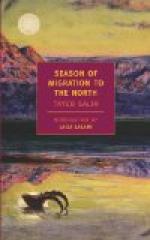Winnipeg, having acquired the growing habit, expands by leaps and bounds. No city on the continent within the last thirty-three years has had such phenomenal growth. In 1876 the population was 6,000; it now counts 150,000 souls. This city is the greatest grain-market in the British Empire, and from it radiate twenty-two distinct pairs of railway tracks. Architects have in preparation plans for fifteen million dollars’ worth of buildings during the coming year. The bank clearings in 1903 were $246,108,000; last year they had increased to $618,111,801; and a Winnipeg bank has never failed. Western Canada cannot grow without Winnipeg’s reaping a benefit, for most of the inward and outward trade filters through here. During the spring months three hundred people a day cross the border from the United States. Before the year has closed a hundred thousand of them will have merged themselves into Western Canada’s melting-pot, drawn by that strongest of lures—the lure of the land. And these hundred thousand people do not come empty-handed. It is estimated that they bring with them in settlers’ effects and cash one thousand dollars each, thus adding in portable property to the wealth of Western Canada one hundred million dollars. In addition they bring the personal producing-factor, an asset which cannot be measured in figures—the “power of the man.”
[Illustration: Winnipeg, the Buckle of the Wheat-Belt]
Not only from the United States do Winnipeg’s citizens come. This City of the Plains is a human mosaic to which finished pattern every nation of the Old World furnishes its patine. The Bible Society of Winnipeg sells Bibles printed in fifty-one different languages—Armenian, Arabic, Burmese, Cree, Esth, Korean, Persian, Sanscrit, Slavonic, Tinne, Urdu, Yiddish, and nine and thirty other tongues. It is to be supposed that some buy their Bible not because it is the Bible but in order to feast the eye on the familiar characters of the home tongue. So would Robinson Crusoe have glutted his sight with a copy of the London Times, could the goat have committed the anachronism of digging one out from among the flotsam in the kelp.
Going into a hardware store to get a hatchet and a copper kettle, we cajole the proprietor into talking shop. He has orders for six hundred steam-ploughs to be delivered to farmers the coming season. We estimate that each of these will break at least fifteen hundred acres during the six months that must elapse before we hope to return to Winnipeg. This will make nearly a million acres to be broken by the steam-ploughs sold by this one concern, and practically the whole number will be used for breaking wild land. A peep into the ledger of this merchant shows in the list of his plough-buyers Russian names and unpronounceable patronymics of the Finn, the Doukhobor, and the Buckowinian. It is to be hoped that these will drive furrows that look straighter than their signatures do. “But




